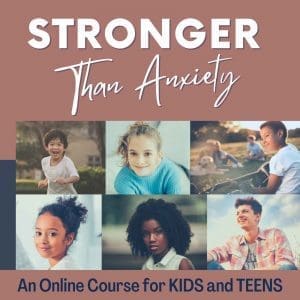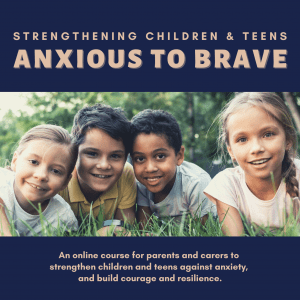On-demand Webinars & Courses
Separation Anxiety – How to Build Their Brave
Saying ‘goodbye’ can be tough! Not only for our children, but for us too – even the strongest and bravest of parenting hearts can feel the wrenching that can come at separation. Separation anxiety exists for a good reason. We want to make children feel loved and supported, and we also want to build brave to make sure that anxiety doesn’t stand in the way of them doing the important, growthful things they need to do. Let’s talk about how. In this 2 hour webinar, we will explore practical, powerful ways to build bravery when separation feels tough – at school, at drop-off, at bedtime – any time beng away from you feels big. The course includes a 50% discount on the purchase of Hey Warrior, Ups and Downs, and The Hey Warrior Workbook.
‘Stronger Than Anxiety’ – A Course for Kids and Teens
Who doesn’t get anxiety!? This is an essential video for any child or teen who has ever felt anxious – a little or a lot. Anxiety and courage always happen together, but so often, anxiety can get in the way of the important, meaningful things we need to do. The truth of it all is that you will always be capable of more than you think you are. You can feel anxious, and do brave. Now to show you how.
Let’s get anxiety out of your way – because the world needs you more than ever.
This course includes a video and a 50% discount on the purchase of Hey Warrior, Ups and Downs, and the Hey Warrior Workbook. Access will be available for 3 months from the date of purchase.
NOTE: This course is included in ‘Anxious to Brave’ – An Online Course for Parents.
‘Anxious to Brave’ – Strengthening Children and Teens Against Anxiety – An in-depth online course for parents. (6 months access)
Children with anxiety have everything they need inside them to light up the world, but too often anxiety will tell them a different story. We know they are capable, brave, strong, and that anxiety doesn’t change that a bit. The challenge is to help them realise it too. Research has shown that with the right support, information, and strategies, parents and carers have a profound capacity to move children and teens towards brave behaviour and strengthen them towards long-term courage, calm, and resilience. The move through anxiety isn’t an easy one, for children or the adults who love them, but it is absolutely possible. As part of this program, we will explore how.
This course includes ‘Stronger Than Anxiety’, a module specifically for young people to help them discover their own brave way through anxiety.
Purchase of the course includes a 70% discount on the purchase of Hey Warrior, Ups and Downs, and The Hey Warrior Workbook.



